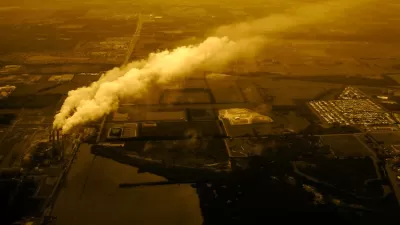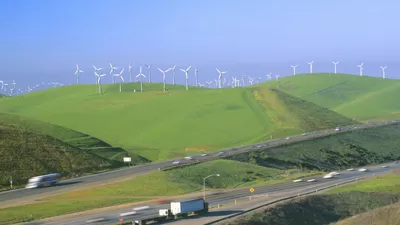Even as the world (unsuccessfully) tries to formulate a treaty to get nations to reduce their carbon emissions, researchers indicate it may be too late - the tipping point may have been reached. But what if CO2 could be extracted from the air?

Pipedream? Not if Carbon Engineering, a Canadian start-up company "formed in 2009 with $3.5 million from Bill Gates and others" has its way. A more immediate application of the technology, however, may lie "in developing a rational price for carbon emissions" according to Timothy A. Fox, head of energy and environment at the Institution of Mechanical Engineers in London.
Anne Eisenberg writes about the company and the technology - an application of the controversial process known as "carbon capture and storage" that may be essential to mitigate climate change, particuarly for the developing world that increasingly has turned to coal, the most carbon intensive fossil fuel, for power generation. According to World Resources Institute, "CCS is a critical option in the portfolio of solutions available to combat climate change, because it allows for significant reductions in CO2 emissions from fossil-based systems, enabling it to be used as a bridge to a clean and sustainable energy future."
"Yet the cost of capturing carbon dioxide directly from the air has yet to be demonstrated, said Alain Goeppert, a senior research scientist at the Loker Hydrocarbon Research Institute at the University of Southern California. Dr. Goepper recently reviewed the literature of air capture technology.
“There is a lot of speculation of how much it will actually cost,” he said, with estimates from $20 a ton to as much as $2,000. “We won’t know for sure until someone builds a pilot plant.” (An average passenger vehicle generates about five tons of carbon dioxide a year.)"
Even if the 'capture' part proves financially, feasible, there's still the 'storage' part. Eisenberg writes that an immediate, if somewhat ironic application would be for "enhanced oil recovery" whereby the CO2 is used to extract 'stranded oil resources'.
As for permanently burying (or sequestering) the extacted carbon dioxide, according to a recent U.S. Department of Energy report, there are "at least 2,400 billion metric tons of U.S. CO2 storage."
FULL STORY: Pulling Carbon Dioxide Out of Thin Air

Planetizen Federal Action Tracker
A weekly monitor of how Trump’s orders and actions are impacting planners and planning in America.

Restaurant Patios Were a Pandemic Win — Why Were They so Hard to Keep?
Social distancing requirements and changes in travel patterns prompted cities to pilot new uses for street and sidewalk space. Then it got complicated.

Map: Where Senate Republicans Want to Sell Your Public Lands
For public land advocates, the Senate Republicans’ proposal to sell millions of acres of public land in the West is “the biggest fight of their careers.”

Maui's Vacation Rental Debate Turns Ugly
Verbal attacks, misinformation campaigns and fistfights plague a high-stakes debate to convert thousands of vacation rentals into long-term housing.

San Francisco Suspends Traffic Calming Amidst Record Deaths
Citing “a challenging fiscal landscape,” the city will cease the program on the heels of 42 traffic deaths, including 24 pedestrians.

California Homeless Arrests, Citations Spike After Ruling
An investigation reveals that anti-homeless actions increased up to 500% after Grants Pass v. Johnson — even in cities claiming no policy change.
Urban Design for Planners 1: Software Tools
This six-course series explores essential urban design concepts using open source software and equips planners with the tools they need to participate fully in the urban design process.
Planning for Universal Design
Learn the tools for implementing Universal Design in planning regulations.
Heyer Gruel & Associates PA
JM Goldson LLC
Custer County Colorado
City of Camden Redevelopment Agency
City of Astoria
Transportation Research & Education Center (TREC) at Portland State University
Camden Redevelopment Agency
City of Claremont
Municipality of Princeton (NJ)



























